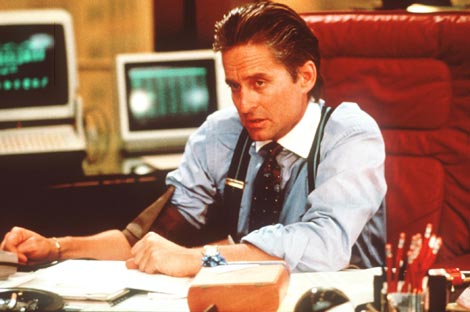 |
|
Michael Douglas as Gordon Gekko in "Wall Street".
|
Global banks sit in crisis. Mortgage-holders sit in default. Bernie Madoff sits in his apartment. And Hollywood wonders whether it might be sitting on a storytelling goldmine.
A host of film projects in the indie and studio worlds are gaining momentum just as the biggest economic crisis in decades boils over. From giant studios to startups you've never heard of, from name-brand directors to up-and-comers, there's something swimming in development waters, and it's a story of economic woe.
"I wouldn't say it's a feeding frenzy just yet," one agent said. "But some development people I've talked to have let it be known that, if you do have these ideas, they will rise to the top of the pile."
Unlike the television world, where plot elements can go from conception to the screen in a matter of months -- shows including "Ugly Betty" and "Desperate Housewives" have added recession story lines in recent episodes -- the film world takes much longer to see stories through.
But that hasn't stopped companies from pushing forward.
Fox has restarted long-rumored talk of a "Wall Street" sequel, more than two decades after the era-defining original, though Oliver Stone's picture was set in and released into a world still in a bubble of economic prosperity. The studio has hired Allan Loeb to write a new draft and sees the picture as a social comment of sorts: Gordon Gekko entering a world too cutthroat even for him.
"Australia" director Baz Luhrmann, meanwhile, is moving ahead with a "Gatsby" story he feels will be a parable of our times. And Participant Prods., always up for a socially relevant tale, is developing "Minimum Wage," about a corrupt executive sentenced to live on the low wages of the people his greed exploited.
Many of the projects are in development partly as an insurance policy; when a story is so culturally dominant, executives feel a related project or two on the slate doesn't hurt, even if they don't intend to green-light it anytime soon.
And studios' records for developing projects with a timely bent are mixed. While crises can give rise to great works -- think "All the President's Men" and Watergate -- those examples tend to be rare. They also tend to happen after the public has had several years to digest a crisis, as failed attempts to tap into ongoing turmoil in the Middle East with such pictures as "Lions for Lambs" and "Rendition" proved.
Ben Younger, who chronicled the bubble of another era with his late-'90s Wall Street tale "Boiler Room," said Hollywood sometimes rushed in without an eye toward the movie's long-term health.
"You look at a movie like 'Wall Street,' and my movie may suffer the same fate -- it feels really, really dated," he said.
Experts also say that while a zeitgeist can affect viewing habits, Hollywood can be too literal about trying to capitalize on it.
"One of the most popular genres during the Depression was the gangster movie because people felt powerless and wanted a solution outside the system," Syracuse University's Robert Thompson said. "Good art packages and processes; it doesn't copy, which is why it's hard to develop stories about current events."
But producers and filmmakers are hoping that, in the right context, these tales can work.
"If you wanted to show a mirror to people that says 'You've been drunk on money,' they're not going to want to see it," said Luhrmann, who says he wants to move quickly on "Gatsby." "But if you reflected it on another time, I think they'd be willing to."
Startup Half Shell Entertainment recently acquired a series of articles from New Yorker scribe James Surowiecki, one of the first journalists to foresee the financial collapse. The banner's partners are aiming for a "Traffic"-like story that humanizes instead of lectures.
"There's not a big market for a 'W.'-like project, where you have an actor playing Alan Greenspan or an actor playing Ben Bernanke," Half Shell's Rob Salvatore said. "But I think if you tell the story about ordinary people, they'll want to see it."
Executives also say that while they realize that the American public might not want to be reminded of troubled times as they're overwhelmed by them, they also might want the onscreen catharsis of seeing executives brought low. In a symbolic stroke, Participant has brought on "Mean Girls" director Mark Waters to shoot "Minimum Wage." Five years ago, it was all about bad girls and their cliques. Now, it's about bad executives and their cliques.
There also might be a financial reason these projects could get fast-tracked: Some of the potential financiers are more interested in these stories because these are the stories close to their heart.
Still, observers say that any project banking on audiences abandoning their usual tastes are misguided -- aspirational entertainment has a role to play even in the toughest times.
"We've spent decades lapping up things like 'Lifestyles of the Rich & Famous,'" Thompson said. "That's not going to turn into a fascination with 'Lifestyles of the Foreclosed and Indigent.'"
(China Daily/Agencies January 14, 2009)